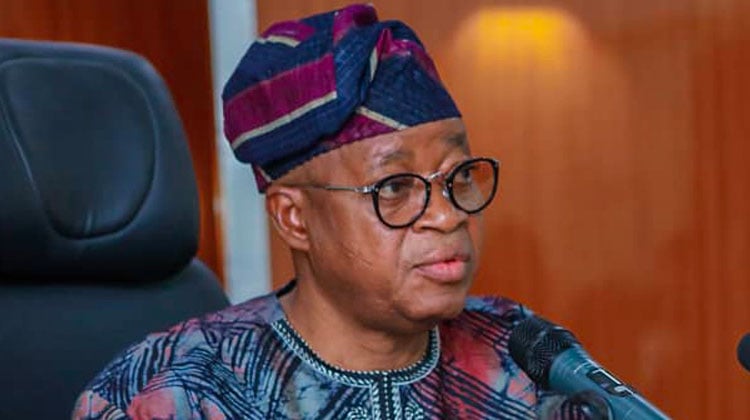The Minister of Marine and Blue Economy, Adegboyega Oyetola, has announced an increase in Nigeria’s local fish production, saying the rise reflects renewed investment, stronger cooperation with coastal communities, and targeted reforms in aquaculture. Oyetola made the announcement in Lagos on Monday while declaring open the 2025 Nigerian Maritime Expo, also known as NIMAREX. He was represented by the Senior Special Adviser to the President on Marine and Blue Economy, Prof Busayo Fakinlede.
According to the Minister, local fish production grew from 1.1 million metric tonnes in 2024 to 1.4 million metric tonnes in 2025. He said the growth is a clear sign that Nigeria’s blue economy reforms are beginning to yield measurable results in the areas of food security, job creation and economic stability. Oyetola explained that the Ministry is working with operators and coastal communities to expand sustainable aquaculture, protect local jobs and cut down on excessive fish importation in line with Nigeria’s economic priorities.
He noted that the National Policy on Marine and Blue Economy remains the backbone of the government’s recent achievements. The policy guides reforms across shipping, coastal tourism, maritime services and offshore energy. Oyetola, who is a former governor of Osun State, also highlighted the strong fiscal performance of maritime agencies in 2024, which generated N1.39tn—double the previous year’s revenue. He attributed this growth to improved transparency and operational discipline.
The Minister announced the gazetting of Nigeria’s first Inland Water Safety Code in more than 40 years. He said the ministry has also expanded patrols, improved charting, and enhanced rescue coordination to support safer waterways. Oyetola reaffirmed the success of the Deep Blue Project, noting that its implementation has kept piracy at zero for three consecutive years, earning Nigeria international commendation for improved maritime security.
He urged stakeholders attending the two-day NIMAREX 2025 Expo to deepen innovation in shipping, maritime technology, port services, ocean energy, logistics and coastal tourism. Oyetola stressed that the maritime industry holds huge potential for economic diversification and should continue attracting investment from local and international partners.
Delivering the lead paper at the event, Ambassador Nancy Karigithu, Adviser on the Blue Economy at the Executive Office of the President of Kenya, noted that marine and blue economy activities cut across more than 22 ministries in Kenya. She emphasised the importance of creating an inter-ministerial committee to ensure smooth collaboration and effective planning. Karigithu highlighted the strategic importance of sustainability in fisheries and aquaculture, calling for greater coordination, proper planning and long-term management.
Earlier, the Chairman of the occasion and Olubadan of Ibadanland, His Imperial Majesty Oba Rashidi Ladoja, said Nigeria’s shipping industry has the potential to create thousands of jobs for the country’s youth and transform the economy. However, he expressed concern that Nigerian maritime operators are “feeding on crumbs,” noting that many of them are not able to participate meaningfully in major global shipping operations. He recalled the early success of NIMAREX and pledged his full support—both financial and intellectual—towards sustaining the renewed platform.
In his welcome remarks, Chairman of the 2025 NIMAREX Planning Committee, Sola Adewumi, described the relaunch of NIMAREX as a revival of a long-term vision to unite public and private stakeholders in the maritime industry. He said the relaunch shows the resilience of the sector and its continued importance to Nigeria’s economic future. Adewumi commended President Bola Ahmed Tinubu for showing political will by creating a dedicated Ministry of Marine and Blue Economy. He said NIMAREX remains the collective voice of the maritime industry and urged agencies, operators, investors and international partners to support the renewed drive for maritime growth and global competitiveness.
One of the highlights of the event was the presentation of a posthumous award to Nigeria’s first indigenous shipowner, the late Alhaji Wahab Folawiyo. The award was received on behalf of the family by Mohammed Folawiyo, Executive Director, Investments, Folawiyo Group. Consultant for NIMAREX 2025, Funmi Folorunso, shared her memories of working as a young staff member at the then Ministry of Transportation and Aviation, where she registered the first indigenous-owned vessels belonging to the late Folawiyo. She urged the Minister to revive the shipping sector in a way that encourages the growth of Nigerian-owned vessels for domestic and international maritime operations.
The idea behind NIMAREX was to create a platform similar to major global maritime exhibitions. It was established to showcase Nigeria’s maritime potential, including its large inland waterways, multiple seaports, crude oil and LNG reserves, and its aspiration to become a logistics hub for West and Central Africa. The first edition of NIMAREX took place in 2011.
